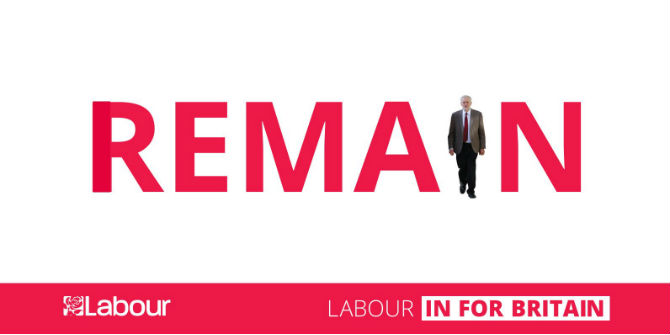 Until we know exactly what kind of Brexit we are going to get, writes Steve Coulter (LSE), it is difficult for Britain to craft an informed industrial strategy. Yet that is what the government is trying to do. If the UK does leave the Single Market and customs union, it may come under pressure to intervene heavily in some manufacturing industries. It might also be wise to invest in sectors like life sciences, which could prosper in the global market the government aspires to enlarge.
Until we know exactly what kind of Brexit we are going to get, writes Steve Coulter (LSE), it is difficult for Britain to craft an informed industrial strategy. Yet that is what the government is trying to do. If the UK does leave the Single Market and customs union, it may come under pressure to intervene heavily in some manufacturing industries. It might also be wise to invest in sectors like life sciences, which could prosper in the global market the government aspires to enlarge.
In November 2017 the government published its long-awaited White Paper on ‘industrial strategy’. With Brexit lurking in the background, the paper attracted a degree of interest that doesn’t usually swirl around such policy submissions. In fact, Brexit was probably one of the least interesting things in the White Paper – largely because we don’t know what kind of Brexit is coming, so there wasn’t much it could usefully say on the matter. Instead, it carefully laid out the government’s thinking on its responses to a fast-changing global economy whose challenges, and also opportunities, will surely be amplified by the disruption from quitting the EU.

Does industry need a ‘strategy’?
Before getting to Brexit, though, it’s worth examining how we got to the point where a Conservative government is cheerfully laying out detailed plans to intervene in the free market. For an ‘industrial strategy’ is really just a nice, holistic-sounding word for an old idea – industrial policy. Industrial policy is any type of government intervention that tries to improve the business environment or alter the structure of economic activity, for example by encouraging firms to move into higher value-added market sectors. Mainstream economics has long acknowledged a role for governments in attending to failures of the market that may see firms under-invest in public goods like training or R&D. There is also a growing appreciation of the role of the state in catalysing private sector restructuring and sharing risks.
Economists commonly identify two main types of industrial policy: ‘horizontal’ policy, consisting of broad, sector neutral inputs into things like training and infrastructure; and ‘vertical’, which single out specific sectors like aerospace for special treatment. In practice, the two types tend to merge somewhat – a training policy that priorities robotics skills, for example.
Almost all governments do industrial policy, whether they admit to it or not. But the UK has a particularly chequered record which means any mention of the term invites derision about the folly of ‘picking winners’. This summons bad memories of industrial policy, 1970s-style, when vast subsidies went to prop up loss-making industries like cars and shipbuilding in an abortive bid to save jobs and preserve national champions. Vertical, or sector-specific, industrial policy is particularly prone to being captured by the recipients of governments’ well-meaning largesse, as picking winners morphs easily into backing losers. But even uncontroversial-sounding horizontal policies are prone to costly mistakes, given the inherent difficulty of guessing industries’ needs and devising policies to meet them.
Historically, therefore, industrial policy has evolved to try to reconcile these two types of failure – market and government. The White Paper does this by incorporating lessons from the past, such as getting sectors to compete for funding rather than simply doling it out. In setting out various ‘missions’, such as preparing for an ageing workforce, it focuses on outcomes rather than processes, and the Paper also has a good sense of Place through the emphasis on regional clusters. The Strategy acknowledges the changing nature of the global economy, particularly the emergence of international production chains, not to mention opportunities to exploit artificial intelligence.
Brexit means what industrial strategy?
Above all this hovers the most fundamental economic challenge of all – Brexit. The White Paper mentions Brexit frequently, but obliquely, as though cautious about assigning to it specific policy commitments. The main reason for this is that we still don’t know what Brexit we are going to get. A ‘soft’ Brexit, as favoured by the Treasury and most of British industry, would see the UK remaining closely integrated with the European economy, probably remaining in the customs union, if not the Single Market. Such an outcome implies no urgent new role for industrial policy over and above that required to deal with the ongoing challenges mentioned above.
A hard Brexit is another matter entirely. Being outside the customs union implies major disruption to manufacturing supply chains. Components for cars, for example, whizz back and forth across the Channel before ending up in the finished vehicle. Even small extra costs and delays at the point of entry would disrupt business models which rely on keeping minimal inventories to bear down on costs. Outside the customs union, there is a clear risk they may invest elsewhere to avoid this. An industrial policy for a hard Brexit could usefully be tasked with nurturing UK component suppliers to reduce the industry’s heavy reliance on imports.
Similarly, shifting UK trade from Europe to America and the Far East, if successfully achieved, entails forging new economic relationships with countries with different consumer markets and patterns of comparative advantage. There may be an enhanced role for the government or – ideally – quasi-public bodies such as the new Business Bank or the Local Enterprise Partnerships set up by the coalition government, in helping to coordinate the necessary restructuring.
A government really prepared to bite the bullet could go even further down the interventionist route. For example, exiting the EU and its stringent rules on state aid affords a much freer hand to directly support ‘strategic’ industries. The government has already started down this road with its open-ended commitment to Nissan to protect the Japanese car firm’s future investments from Brexit-related uncertainty. Such deals might sound tempting, especially if a hard Brexit starts to go wrong, but it carries clear dangers of government-capture and other investors would surely demand similar guarantees.
A more canny strategy would be to target support at established industries competing in growing markets that might stand to benefit from the more global approach that Brexit possibly affords. The £64bn life sciences sector is a good example of a UK success story in an industry replete with market failures owing to its riskiness and the heavy up-front investment required in skilled technicians and R&D. Life sciences is one of four sector deals singled out for special attention in the form of heavy investment and institution-building – presented, of course, as a ‘partnership’ with industry.
Will it be enough? UK governments have not covered themselves in glory with their use of industrial policy. The country’s excessive centralisation and paucity of effective coordinating institutions may derail the best of intentions. All the talk of high technology and industries of the future may not produce many jobs for humans if automation takes off as envisaged, fuelling the discontent that led to the Leave vote. Brexit, even if it succeeds, will probably be too disruptive a process for governments to tame with policy. The White Paper is a good start though.
This post represents the views of the author and not those of the Brexit blog, nor the LSE.
Dr Steve Coulter is a Visiting Fellow in the European Institute of the London School of Economics.






